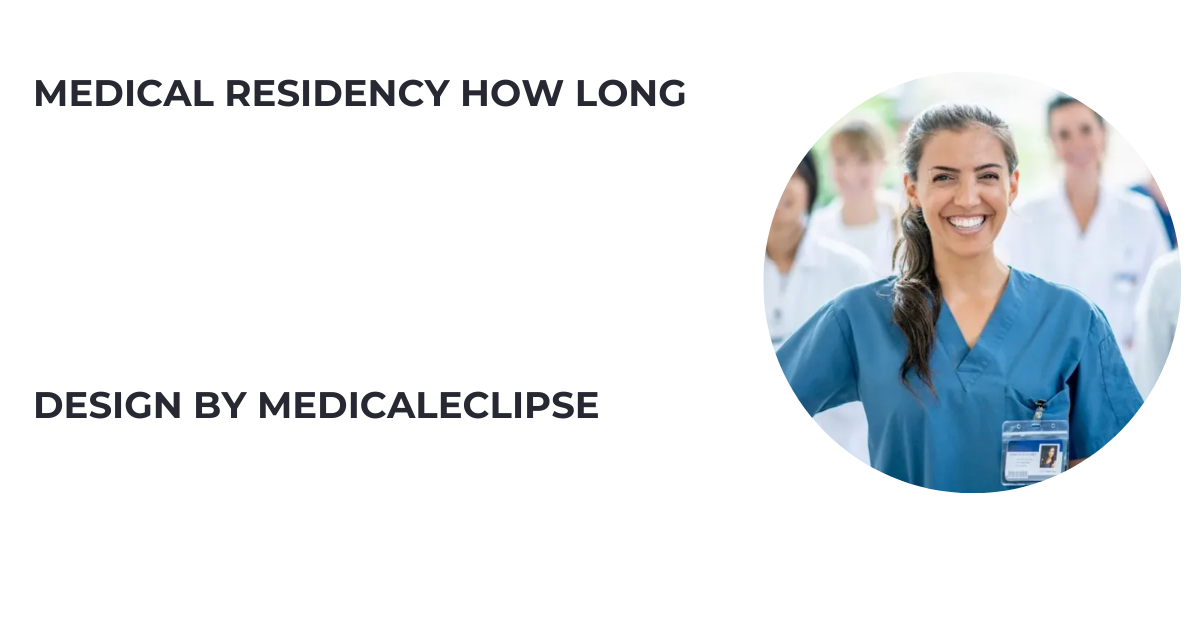Medical residency typically lasts 3 to 7 years, depending on the specialty. The duration varies based on factors like subspecialization and program requirements.
In this article, we’ll explore the typical duration of medical residency programs, what factors can influence how long residency lasts, and how it impacts your career path.
What is Medical Residency?

Medical residency is a stage of graduate medical education that follows the completion of medical school. During residency, new doctors work under the supervision of experienced physicians, gaining practical, real-world experience in diagnosing and treating patients. Residency programs are designed to prepare doctors to work independently and specialize in a particular area of medicine.
How Long Does Medical Residency Last?
The length of medical residency depends on the specialty you choose. On average, residency can last anywhere from 3 to 7 years. Here’s a breakdown of typical residency lengths by specialty:
- Family Medicine: 3 years
- Internal Medicine: 3 years
- Pediatrics: 3 years
- General Surgery: 5 years
- Obstetrics and Gynecology (OB/GYN): 4 years
- Psychiatry: 4 years
- Orthopedic Surgery: 5 years
- Neurosurgery: 7 years
- Cardiology (fellowship after internal medicine residency): 3 additional years (post-residency fellowship)
- Dermatology: 4 years
Also Read: Is Chinatown Close To Tufts Medical Center – Proximity and Travel Tips!
What Factors Affect the Length of Residency?
While the specialty plays a significant role in determining how long residency lasts, other factors can also impact the duration:
Subspecialization:
Some doctors choose to specialize even further after completing a general residency. For example, after finishing a general surgery residency, a doctor might pursue a fellowship in a subspecialty like pediatric surgery or vascular surgery, which can add additional years of training.
Program Requirements:
Some residency programs offer combined programs or require additional years for research or other specialized training, which can influence the length of time.
Board Certifications:
To practice in certain specialties, doctors must pass board exams, and some programs may extend residency to ensure that doctors are adequately prepared for certification.
Personal and Professional Factors:
Personal circumstances, such as family obligations or health issues, can sometimes affect the duration of residency. In rare cases, medical professionals may take time off during their training, leading to extended programs.
The Process of Completing Medical Residency:

Application:
After medical school, graduates apply for residency programs through a centralized match system in their country. In the U.S., this system is called the National Resident Matching Program (NRMP).
Intern Year:
The first year of residency is often called the “intern year,” during which residents rotate through different specialties. This year is typically spent learning general medical skills before focusing on the chosen specialty.
Progression Through Residency:
After the intern year, residents focus on their specialty, taking on more responsibilities and leadership roles. As they progress, they gain autonomy in patient care and surgical procedures (depending on their specialty).
Fellowships (Optional):
After completing residency, some doctors decide to further specialize by completing a fellowship. Fellowships are additional years of training in specific subspecialties, such as cardiology, oncology, or infectious disease.
How to Choose the Right Residency Length for You?
Choosing the right residency for you involves considering various factors beyond just the length of the program. These factors include:
- Interest in the Specialty: Think about what excites you in medicine, whether it’s surgery, pediatrics, internal medicine, or another area.
- Lifestyle Considerations: Some specialties have longer work hours and more demanding schedules, so it’s important to think about how a residency will impact your work-life balance.
- Career Goals: If you’re interested in subspecialization, you’ll need to plan for additional training after residency. Consider whether a longer residency or fellowship aligns with your long-term career goals.
Also Read: Where Do Drexel Medical Students Rotate – Essential Rotation Locations!
The Importance of Residency in Your Medical Career:
Although residency is challenging, it is an essential step in your medical journey. This stage not only provides you with the experience needed to practice independently, but it also shapes your professional identity. Many doctors find that their residency experience helps refine their skills, enhance their knowledge, and solidify their passion for a particular area of medicine.
Hands-on Training and Experience:
One of the most significant reasons residency is vital is the opportunity to apply what you learned in medical school in real-world settings. During your residency, you’ll work directly with patients, make diagnoses, perform procedures, and manage cases under the supervision of attending physicians. This hands-on training allows you to transition from theoretical knowledge to practical, on-the-job experience.
Specialization and Expertise Development:
Medical residency is where you’ll focus on a specific area of medicine that aligns with your interests and career goals. Whether it’s general surgery, pediatrics, cardiology, or psychiatry, residency allows you to dive deeply into your chosen specialty and gain the knowledge and skills necessary to become an expert in that field. For those who wish to further specialize, fellowships after residency provide an opportunity to gain additional expertise in niche areas.
Building Confidence and Independence:
As a resident, you’ll gradually take on more responsibility, which will help you build confidence in your medical decision-making abilities. Over time, you’ll handle more complex cases, manage patient care plans, and begin to work independently. This process of increasing autonomy is crucial for developing the self-assurance needed to practice medicine without supervision once your residency is complete.
Networking and Mentorship:
Residency is not just about gaining medical knowledge; it’s also an opportunity to network with other healthcare professionals and build long-lasting relationships with mentors. The connections you make during residency can open doors to future career opportunities, research collaborations, and provide ongoing support throughout your medical career. Having mentors who guide you through your residency helps you navigate challenges and grow both professionally and personally.
FAQ’s
1.How long is medical residency?
Medical residency lasts between 3 to 7 years, depending on the specialty.
2.What factors affect the length of residency?
Factors include the specialty chosen, subspecialization, fellowship opportunities, and program requirements.
3.Is residency mandatory after medical school?
Yes, residency is essential for hands-on training and is required to become a licensed doctor.
4.How long does residency last for general surgery?
General surgery residency typically lasts 5 years.
5.Can I specialize further after residency?
Yes, further specialization through fellowships is common and can add additional years of training.
Conclusion
Medical residency is a demanding yet rewarding phase in a doctor’s career, ranging from 3 to 7 years depending on the specialty. Whether you choose a relatively short program like family medicine or embark on a longer one like neurosurgery, residency will prepare you to provide quality care and specialize in your chosen field. Understanding the length of your residency and planning accordingly will help you navigate the exciting journey to becoming a fully licensed physician.

Leave a Reply